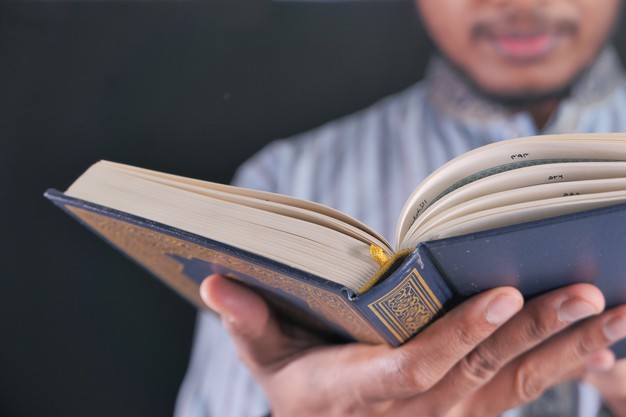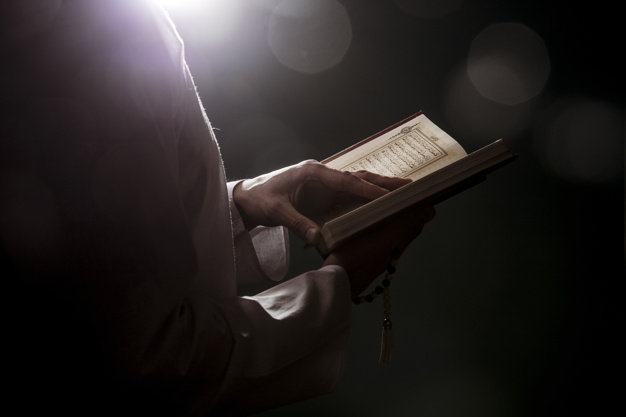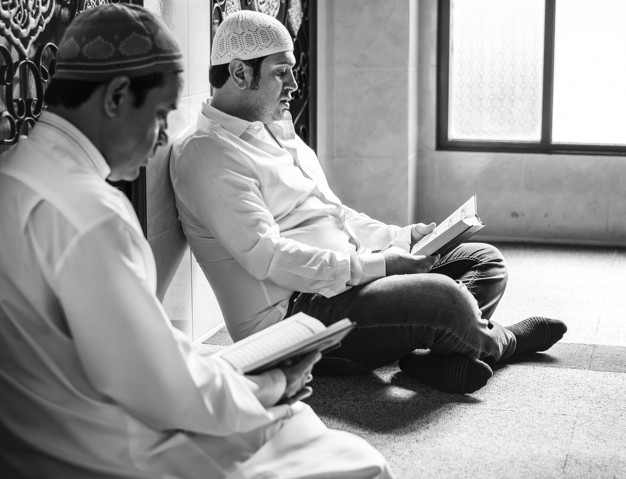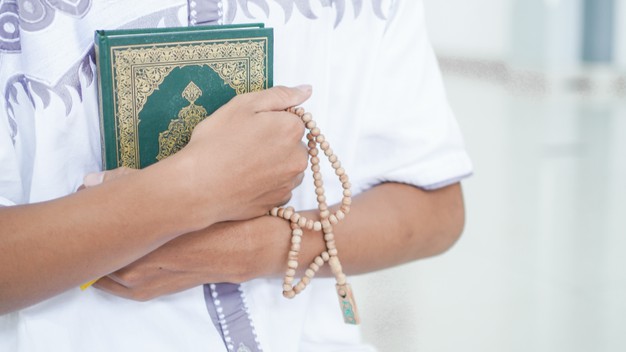11 Ways to Control Anger According to Islam, Practice to Control Emotions
The Prophet Muhammad has exemplified the best way to control anger that you can practice. Let's take a look, KLovers!

Kapanlagi.com - Praise before prayer is usually recited in mosques or prayer rooms after the call to prayer, before performing obligatory prayers. Praise before prayer is recited by the congregation while waiting for other congregants who have not yet arrived. In Indonesia, this praise can be recited in Arabic or local languages.
Because the words sound rhythmic and poetic, praise before prayer has become a habit of the community and easily spreads to other mosques or prayer rooms. Before reciting it, the congregation usually also recites blessings for the Prophet, which has many virtues.
Based on a hadith narrated by Abu Hurairah r.a (in Assamarqandi, 1980: 619), the Prophet Muhammad (SAW) said:
"Recite blessings for me, because reciting blessings purifies your impurities (sins) and ask Allah for me to be granted the wasilah. What is the wasilah, O Rasulullah? He answered: It is the highest degree in heaven that can only be attained by one person, and I hope that I am that person."
Well, to find out more about the explanation of praise before prayer and various examples, please read the information compiled from various sources below.

Illustration (Credit: Freepik)
After the call to prayer from the mosque or musalla near your house, you may hear the recitation of praise before prayer. Among the praises are good words, recitation of blessings, various advice, and prayers sung to wait for the prayer time.
Praising after the call to prayer is a good practice and has many benefits for preaching and can attract the interest of the community, especially children, to flock to the mosque, musalla, and sing together songs that contain praises.
By absorbing its meaning, it will make the soul calm, self-aware, understand feelings, control anger, and be able to control emotional turmoil. In addition, you can build sweet relationships with other congregants. In this way, you can have good mental health and spiritual intelligence.
Praise before prayer was originally spread among pesantren communities. Some also say that praise before prayer was introduced by the Walisongo, who were the spreaders of Islam on the island of Java.
As the public knows through history, the approach used by the Walisongo in spreading Islam was a persuasive approach that was community-oriented, in accordance with local customs, culture, and art.
One example is Sunan Giri, who created Asmaradana and Pucung. Sunan Giri also created children's songs that contained Islamic elements, such as Jamuran, Cublak-cublak Suweng, Jithungan, and Delikan (Rahimsyah, no year: 54).
In addition to Sunan Giri, there is also Sunan Bonang who created literary works called Suluk. Suluk comes from the Arabic word "Salakattariiqa" which means to follow the path (of Sufism) or tarikat. The teachings of Suluk are usually conveyed through sekar or tembang called Suluk, while if expressed in prose it is called Wirid.
One of the famous Suluk Wragul from Sunan Bonang is Dhandanggula. Some people (who are familiar with the tarikat) say that the praise texts were created by the leaders of the tarikat and Syekh Abdul Qadir Jailani.

Illustration (Credit: Freepik)
Praise before prayer is usually recited from verses written by Islamic figures or scholars who are used as role models, one of them is Gus Dur. Here are some verses from Gus Dur that you can recite as praise before prayer.
Astaghfirulloh Robbal baroyaah
Astaghfirulloh Minal Khothoyah
Robbi zithni 'ilmannafii'aa
Wawaffiqni 'Amalaan sholikha
Ya roshulalloh salam mun'alaika
Ya rofi'asyaaniwaddaarojii
'Athfataiyajii rotal'alaami
Ya Uuhailaljudiwalkaromi
Ya Uuhailaljudiwalkaromi
Ngawiti ingsun nglara syi'iran
Kelawan muji pareng pengeran
Kang paring rohmat lan kenikmatan
Rino wengine tanpo pitungan
Rino wengine tanpo pitungan
Duh bolo konco prio wanito
Ojo mung ngaji syare'at bloko
Gur pinter dongeng nulis lan moco
Tembe mburine bakal sangsoro
Tembe mburine bakal sangsoro
Akeh kang apal Qur'an Hadis e
Seneng Ngafirkeh marang liyane
Kafir e dewe Ga' di gatekke
Yen isih kotor ati akale
Yen isih kotor ati akale
Gampang kabujuk Nafsu angkoro
Ing pepaese Gebyare ndunyo
Iri lan meri sugi e tonggo
Mulo atine peteng lan Nisto
Mulo atine peteng lan Nisto
Ayo sedulur Jo nglale ake
Wajib e ngaji sak pranatane
Nggo ngandelake iman Tauhid e
Baguse sangu mulyo matine
Baguse sangu mulyo matine
Kang aran sholeh bagus atine
Kerono mapan sari ilmune
Laku torekot lan ma'rifate
Ugo hakekot manjing rasane
Ugo hakekot manjing rasane
Alqur'an kodhim wahyu minulyo
Tanpo tinulis iso diwoco
Iku wejangan guru waskito
Den tancep ake ing njero dodo
Den tancep ake ing njero dodo
Kumantel ati lan pikiran
Mrasuk ing badan kabeh njeroan
Mukjizat rosul dadi pedoman
Minongko dalan manjing e iman
Minongko dalan manjing e iman
Kelawan Alloh Kang maha Suci
Kuduh rangkulan rino lan wengi
Di tirakati di riadhoi
Dzikir lan suluk jo nganti lali
Dzikir lan suluk jo nganti lali
Urip e ayem rumongso aman
Dununge roso tondo yen iman
Sabar nerimo snajan paspasan
Kabeh tinakdir saking pengeran
Kabeh tinakdir saking pengeran
Kelawan konco dulur lan tonggo
Kang podo rukun ojo daksio
Iku sunnah e rosul kang mulyo
Nabi muhammad panutan kito
Nabi muhammad panutan kito
Ayo nglakoni sekabeane
Alloh kang bakal ngangkat drajate
Senajan ashor toto dhohire
Ananging mulyo makom drajat e
Ananging mulyo makom drajat e
Lamun palastro ing pungkasane
Ora kesasar roh lan sukmane
Den gadang Alloh syuargo manggone
Utuh mayite ugo ules
Utuh mayite ugo ules
Ya roshulalloh salam mun'alaika
Ya rofi'asyaaniwaddaarojii
'Athfataiyajii rotal'alaami
Ya Uuhailaljudiwalkaromi
Ya Uuhailaljudiwalkaromi

Illustration (Credit: Freepik)
In addition to conveying praise to the Creator and the Prophet Muhammad, praise before prayer can also be a prayer for both parents and advice for oneself. Let's take a look at the following example of praise.
"Allahummaghfir lii dzunubi
Wa li Walidayya Warhamhuma
Kamaa Robbayaani Shoghira"
Sopo Kang Pengen Uripe Berkah
Sopo Kang Pengen Mati Husnul Khatimah
Ayoo...Tumandang Sholat Berjama'ah
This poem has two meanings and is in two languages. First, it contains a prayer for both of our parents. So that Allah SWT is pleased to grant forgiveness to all of us and to our parents, and so that Allah SWT loves them as they love us when we were little.
Praying for parents is one of the ways we can be dutiful to our parents, which is the sunnah of Prophet Muhammad. In the Quran [Al Isra/17: 23], it is also explained that we should be good to our mothers and fathers.
"And your Lord has decreed that you not worship except Him, and to parents, good treatment."
Prophet Muhammad also explained the importance of being dutiful to parents in his hadith [HR Bukhari no. 5.970], and even prioritized being dutiful to them over jihad fi sabilillah. Ibn Mas'ud said:
I once asked the Prophet, "What deed is most beloved by Allah?" He replied, "Prayer at its proper time." I asked again, "Then what?" He answered, "Being dutiful to parents," he continued. I asked again, "Then what?" He answered, "Jihad in the way of Allah."
In the second verse of the poem, which is recited in Indonesian language, it also contains a very deep meaning. An invitation for anyone who desires a blessed life and a good ending, it is advisable to perform congregational prayer. Prophet Muhammad (peace be upon him) said (explained in the book Bulughul Maram):
From Abdullah Ibn Umar (may Allah be pleased with him) that the Messenger of Allah (peace be upon him) said: "Congregational prayer is superior by twenty-seven degrees than praying alone." Muttafaq

Illustration (Credit: Freepik)
Praise before prayer recited by the congregation can also be a bridge to seek forgiveness and repentance for the sins committed. If understood deeply, you can gain life lessons through its verses. Here are examples of praise before prayer to seek forgiveness that you can take note of.
"Astaghfirullahal'adzim
Alladzii Laailaha Illa huwalhayyul Qoyyumu
Wa Atubu Ilaihi Taubatan 'Abdin Dzolimi
Laa Yamliku Linafsihi Dhoro Wa La Naf'a
Wa La Mauta wa La Hayaata wa La Nushura"
The praise before prayer above contains the verses of a sinful servant's confession, seeking forgiveness from Allah SWT.
"O Allah, there is no god but You. And I sincerely repent to You with true repentance, the repentance of a servant full of injustice, a servant who does not even own himself, who is unable to bring harm or benefit to life, death, or even resurrection."
This is one of the prayers commonly recited after performing Taubat prayer. Allah SWT says in the Quran, Surah At-Tahrim, verse 8:
"O you who have believed, repent to Allah with sincere repentance. Perhaps your Lord will remove from you your misdeeds and admit you into gardens beneath which rivers flow [on] the Day when Allah will not disgrace the Prophet and those who believed with him. Their light will proceed before them and on their right; they will say, "Our Lord, perfect for us our light and forgive us. Indeed, You are over all things competent."
That is the explanation and some examples of praise before prayer that you can recite during the time between the call to prayer and the iqamah.
(kpl/ans)
Cobain For You Page (FYP) Yang kamu suka ada di sini,
lihat isinya
The Prophet Muhammad has exemplified the best way to control anger that you can practice. Let's take a look, KLovers!
Here are 6 positive things that can be taken away when you can't go home. What are they? Let's check it out KLovers.
Here are some ways to make delicious homemade street snack cilung for you to try.
Pepes ikan can be made using various types of fish such as tilapia, mackerel, tuna, or catfish. Let's check out the recipe below, KLovers!
Now you can also make delicious banana bolen directly from home. There are many practical and easy banana bolen recipes to make.
Putting funny captions not only makes photos more cool and interesting. Funny words in captions that are very entertaining, able to invite laughter from those who read them.
Lumpia recipes are quite easy to make at home. Lumpia also has many variations of recipes. So, we can make lumpia with the taste according to our preference.
The opportunity to obtain rezeki is open to anyone, but there are practices to open up rezeki along with their effective prayers that can be practiced at any time. Let's take a look, KLovers!
Without further ado, let's take a look at the difficult words to find money, complaints and motivation for yourself below.
Here are 75 latest Eid al-Fitr greetings 1442 H. Let's check it out KLovers.
Without further ado, let's learn the procedures for performing sunnah prayer before Friday prayer along with the explanation below.
Here are some virtues of a wife's prayer that can bring blessings to a family.